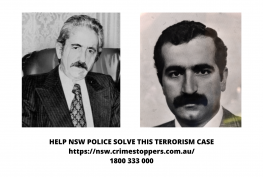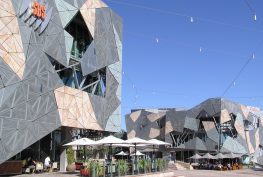Booing of Aborigine Adam Goodes — accompanied by racial slurs and epithets — labelled ‘shameful moment in AFL history’
By Jill Fraser
MELBOURNE
An indigenous footballer is at the heart of a nationwide racism furore after a campaign of unrelenting harassment that culminated last weekend in a torrent of abuse by fans of the opposing team.
The Sydney Swans versus the West Coast Eagles game sparked a booing frenzy directed at Australian Football League (AFL) player Adam Goodes, whose Aboriginal mother was one of the Stolen Generations.
ABC Grandstand commentator Gerard Whateley labelled the booing “a shameful moment in AFL history” and said he feared Goodes may be “booed into retirement”.
The AFL player has triggered a storm of controversy by championing his indigenous background on and off the field.
In May he celebrated a goal with an Aboriginal war dance that featured a spear-throwing gesture, and a war cry directed at the rival team’s supporters.
His actions sparked an unprecedented backlash — critics condemning the performance, labelling it violent, aggressive and confrontational.
Goodes maintains it was a victory dance, denying it was retaliation for the merciless booing he’d been subjected to during a match the previous week.
“It’s an Indigenous Round and I’m proud to be Aboriginal,” he told Channel Seven.
The debate has divided the country, many Australians insisting that their dislike of Goodes is about the man not the colour of his skin.
Legendary cricketer Shane Warne has bought into it, tweeting: “The public can boo or chant whoever’s name they want! It’s nothing to do with being racist.”
Australia’s Race Discrimination Commissioner Tim Soutphommasane disagrees.
“During the match last weekend spectators were ejected because they accompanied the booing with racial slurs and epithets directed at Adam Goodes,” he told Anadolu Agency.
On Sunday, former Australian of the Year Ita Buttrose — one of Australia’s most distinguished media personalities — expressed her unreserved support for Goodes and urged critics to show some understanding.
“Try walking in Adam’s boots for a couple of weeks,” she told Anadolu Agency.
“We have no idea what it’s like to endure the discrimination that Adam and so many other indigenous Australians have [and have had] to suffer.”
In Australia, an estimated 50,000 children were forcibly removed from their Aboriginal families between 1910 and the 1970s. An annual National Day of Healing on 26 May is a day of atonement for the tragically misguided policy that created six generations of what is now referred to as the “Stolen Generations”.
Buttrose is adding her voice to the political, sporting, business, community and indigenous leaders who have weighed in behind the embattled veteran player — a star in the AFL, and also a former Australian of the Year.
Goodes’ supporters include Prime Minister Tony Abbott, actor Hugh Jackman, billionaire James Packer and Sydney Premier Mike Baird and Melbourne Premier Daniel Andrews.
Other well known figures such as actors Cate Blanchett, Hugo Weaving, Richard Roxborough and Peter Phelps, and Opposition Leader Bill Shorten and Greens Immigration spokesperson Sarah Hanson-Young have signed on to a social media campaign #istandwithadam.
Although Goodes was not physically on the field for the Swans versus Crows game on Saturday afternoon — he is on indefinite stress leave; reportedly contemplating retirement — his presence was undeniable.
Swans players ran onto the ground through a banner that screamed the word “RESPECT”, highlights of Goodes’ career were played on the big screen, fans holding placards stating “We Support Adam” and the hashtag “#forgoodes” gave him a standing ovation at the seventh minute of the third quarter – his squad team number is 37 – and shirts bearing the number 37 were everywhere.
There have also been widespread gestures of support for Goodes over the weekend across all Australia’s sporting codes.
Players wearing Indigenous Round shirts, red, yellow and black arm bands to represent the Aboriginal flag and fans waving anti-racism messages from all sporting arenas demonstrated they were standing alongside the player.
The Round celebrates the contribution indigenous footballers have made to the game.
Opponents have highlighted, however, that their dislike of the player is not just about recent behaviour.
They maintain it harks back to incidents in 2013 when, during the opening match of the AFL’s annual Indigenous Round, Goodes challenged a 13-year-old girl who referred him to as “an ape”.
He was criticised for singling the girl out and embarrassing her.
Goodes subsequently explained that he didn’t realise her age, but went on to argue that racist taunts shouldn’t be ignored, regardless of who makes them.
The girl later spoke to Goodes and wrote him a letter of apology, saying she wasn’t aware that the word was racist.
He publicly called for people to rally and support her.
“It’s not a witch-hunt, I don’t want people to go after this young girl,” he said.
“We’ve just got to help educate society better so it doesn’t happen again.”
When Victoria Police asked if he wanted to press charges he declined.
“It’s not her fault. She’s 13, she’s still so innocent, I don’t put any blame on her,” he said.
Despite Goodes’ apparent consideration of the girl’s welfare the incident became a catalyst for vilification and on Thursday her mother re-ignited the issue, telling Fairfax Media she believes Goodes owes her daughter an apology for the “unfair” treatment she received from security staff and police.
The other reason put forward for the incessant heckling directed towards Goodes is his highlighting of indigenous issues and speaking out about racism in his 2014 Australian of the Year acceptance speech.
“It’s his right as an Australian to have a point of view about issues that affect him,” Buttrose told Anadolu Agency.
“He was the 2014 Australian of the Year, and it was his role to use that platform to raise issues that he thinks are of concern to the rest of Australia.
“I suspect there are some people in the community who don’t like a thoughtful, educated indigenous Australian speaking about matters that concern him and other indigenous Australians.”
Soutphommasane is troubled by the slow response of Australia’s political leaders and AFL executives to speak out on the Goodes issue and the inability of some people to recognize that the booing had racial implications.
“There should be no ambiguity now,” he told Anadolu Agency.
“It’s doing harm; it’s done damage to Goodes, the AFL and our society because it’s sent the message that people have the license to degrade, humiliate and intimidate someone who has taken a stand against racism and isn’t afraid to speak up.
“The last thing we want is a society where calling out racism is considered a bigger moral crime than the perpetration of racism.”
On Saturday, the Australian Human Rights Commission issued a joint statement on behalf of 150 community organisations calling for renewed efforts to stamp out racism in sport and everyday life.
Soutphommasane also noted that Australia’s peak Turkish body, the Australian Turkish Advocacy Alliance, has requested that their name be added to the statement.


